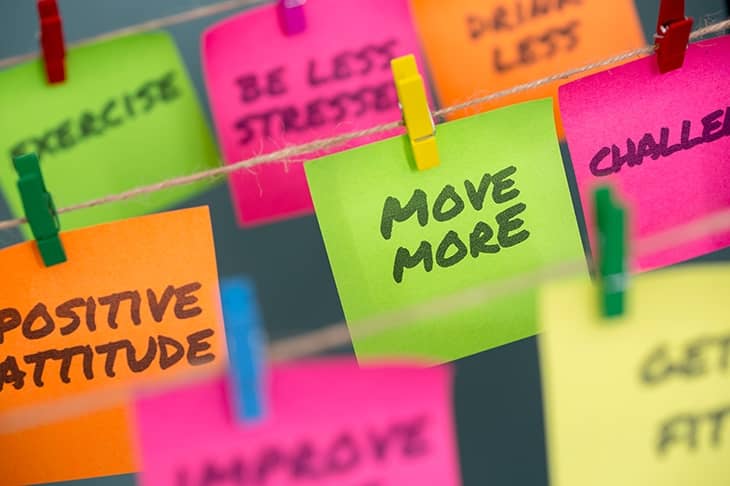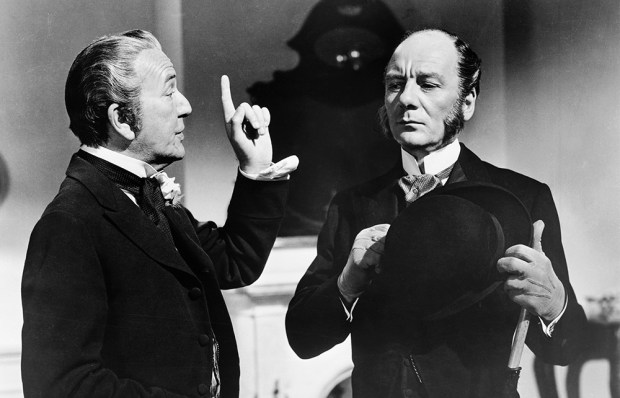If I could lift one thing from younger generations, unpeel one idea from their anxious minds, it would be the notion they have to ‘work on themselves’, and that the point of life is to do this ‘work’ until they feel able to have a relationship, at which point they must grimly set about working on that.
I’m not suggesting that it’s not useful to have treatment or therapy for a particular problem, but it’s as if everyone born after 1990 thinks of themselves the way 1950s man thought of his car — as something to be worked on in every spare moment, tinkered with and polished, but rarely taken out for a spin, for fear of dents.
You can tell an era by its aphorisms. The Victorians stitched them on to footstools and tapestry samplers: ‘The Lord will provide’; ‘Charity begins at home.’ These days, they’re printed on bags, mugs, masks: ‘The best project you’ll ever work on is you!’ Or ‘Work on yourself, for yourself’. Before Christmas I tried to buy a diary for my young goddaughter, but almost every one was stamped with a version of the same horrid message. This, said to be from the Stoic philosopher Epictetus, was popular: ‘Progress is not achieved by luck or accident but by working on yourself.’ And this unattributed shocker too: ‘If you don’t work to improve yourself every day then you are wasting your life.’ No wonder the youth are depressed. If I had to read that every time I had a mug of tea, I’d be suicidal.
My spies in Gen Z tell me that there’s a new standard way to end a relationship these days. Gone is ‘Listen. It’s not you, it’s me’ and in its place ‘I just need some space to work on myself’. OK, ‘It’s not you, it’s me’ was pious and often bogus, but at least it didn’t imply to the poor rejected sap that they were just an impediment to your personal growth, a spanner in the self-work.
In December, the actor James Franco,who has now been accused of abuse by several women, declared himself to be a sex addict who is ‘working on himself to change’ — not so much an apology as a turning of the tables. Suddenly Franco is the injured party, bravely trying to repair his damaged self. ‘I’m a work in progress,’ said Ellen DeGeneres after her employees accused her of bullying.
And what is this vital work anyway? What form does it take? For all the urgency of doing it, the work itself is amazingly vague. If you follow the bestselling Dr Nicole Lepera (How To Do The Work), it’s about recognising destructive patterns of behaviour and healing from your past. If you identify as politically progressive, The Work is a requirement to chew through a curriculum of deadly books about privilege and race. But then there’s the self-care side of it too: getting a manicure, running, knitting, baking, meeting a friend for a drink. Anything can count as The Work as long as you approach it with enough earnest joylessness. Don’t do it for the sheer fun of it, kids, do it because it’s part of your wellness journey towards self-perfection. I can’t think of a more soul-destroying way to lead your life.
Because I’m that way inclined, and not just because of Ellen, I’m tempted to see the whole enterprise as diabolical, or at least a form of Gnosticism. Gnostics held that a lucky few contain a spark of the divine and must work daily to release it. They’d have felt right at home with the Valley’s blue-tick Twitter elect like the actress Katie Cassidy (two million followers): ‘I will work on myself, since the work on myself is the highest thing I can do. #Higherself #Goddess #God #AllThatIs.’
Almost all cults hold out to devout followers the promise of secret knowledge and super skills; they’re like computer games that way — loyalty is rewarded with power. If you’re a Gnostic, you stand to gain secret knowledge of the divine; if you’re Scientologist, you can become psychic and immune from illness and, if I remember right, you can fly too. And if you do your Life Work well, in the end you’ll be able to will things into existence. The FT’s ‘wellness issue’ last week included an article on the trend for ‘manifesting’, or imagining that you can work so hard on yourself and your goals that you actually make them happen. Bernardine Evaristo, author of Girl, Woman, Other, claims that she used manifesting techniques and positive affirmations to win the Booker Prize. I’d like to ask her one day whether she thinks she might have willed it away from a more deserving winner. The author of Manifest, Roxie Nafousi, says she willed her own book into being. But don’t try to wrap your head around the meta-oddness of manifesting a book called Manifest. Just buy a small ceramic incense dish, stamped with the words ‘Manifest That Shit’, for £36 each, or a special manifesting fragrance, ‘I Am Verdant’, at £135 for 50ml, and start willing the world you want.
‘Work harder on yourself than you do at your job.’ That’s another popular quote, from Jim Rohn, one of the great all–American motivational hucksters. Old-fashioned work, paid employment, is seen as intensely suspect by believers in the real work of self–actualisation. No surprise, then, that millennials spend nearly three times as much as their boomer parents on self-help kit. How else are they to be properly prepared for the war on capitalism? I’ve been wondering what on earth the factory workers in China make of it, as they spend 20-hour days printing anti-capitalist slogans on to T-shirts for teenage narcissists.
Perhaps the whole obsession with working on oneself is the inevitable end result of compulsory relativism. ‘What is advertised as a great opening is in fact a great closing,’ wrote Allan Bloom in The Closing of the American Mind. ‘No longer is there a hope that there are great wise men in other places and times who can reveal the truth about life.’ If there’s nothing out there worth exploring, no truths to uncover, you might as well stay at home and work on yourself.
Got something to add? Join the discussion and comment below.
Get 10 issues for just $10
Subscribe to The Spectator Australia today for the next 10 magazine issues, plus full online access, for just $10.
You might disagree with half of it, but you’ll enjoy reading all of it. Try your first month for free, then just $2 a week for the remainder of your first year.















Comments
Don't miss out
Join the conversation with other Spectator Australia readers. Subscribe to leave a comment.
SUBSCRIBEAlready a subscriber? Log in